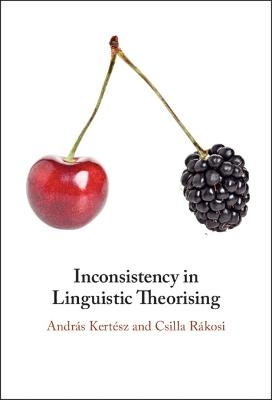
Inconsistency in Linguistic Theorising
Cambridge University Press (Verlag)
978-1-009-10033-5 (ISBN)
It is widely believed that inconsistency is one of the greatest sins a scholar can commit. This issue is especially relevant in linguistics due to the rich diversity of data types, exceptions to the rules, counterexamples to the hypotheses, and background assumptions which constantly come into conflict with methodological principles. Bringing together ideas from linguistics and philosophy of science, this groundbreaking book seeks to answer the following questions: which kinds of inconsistency arise in linguistic theorising? Under which conditions can inconsistencies be tolerated? And how can inconsistencies be resolved? It is the first study to develop a novel metatheoretical framework that accounts for the emergence and the resolution of inconsistency in linguistic theorising, and to reveal the strategies of inconsistency resolution in theoretical linguistics. Supported by detailed case studies, the findings of this metatheoretical analysis can be applied to improve the effectiveness of the working linguist's problem-solving activity.
András Kertész is Professor of Linguistics at the University of Debrecen (Hungary). He is Member of the Hungarian Academy of Sciences and of Academia Europaea. His fields of research are the philosophy of linguistics and theoretical linguistics. Notable publications include Data and Evidence in Linguistics (Cambridge University Press 2012; with Csilla Rákosi). Csilla Rákosi is Senior Research Fellow at the MTA-DE-SZTE Research Group for Theoretical Linguistics, Eötvös Loránd Research Network (ELKH), Hungary. Her fields of research are the philosophy and methodology of linguistics and argumentation theory. Notable publications include Data and Evidence in Linguistics (Cambridge University Press 2012; with András Kertész).
1. Introduction: the Main Problem (P); Part I. The State of the Art: 2. Approaches to inconsistency in the philosophy of science; 3. Approaches to inconsistency in linguistic theorising; Part II. Paraconsistency: 4. The paraconsistent treatment of inconsistency; 5. Prospects and limits of the paraconsistent treatment of inconsistency; Part III. Plausible Argumentation: 6. From paraconsistency to plausible argumentation; 7. Inconsistency and theory change; 8. The treatment of inconsistency in Optimality Theory; 9. The heuristics of inconsistency resolution; Part IV. Summary: 10. The methodological background; 11. Conclusions.
| Erscheinungsdatum | 17.08.2022 |
|---|---|
| Zusatzinfo | Worked examples or Exercises |
| Verlagsort | Cambridge |
| Sprache | englisch |
| Maße | 158 x 235 mm |
| Gewicht | 630 g |
| Themenwelt | Geisteswissenschaften ► Philosophie ► Sprachphilosophie |
| Geisteswissenschaften ► Sprach- / Literaturwissenschaft ► Sprachwissenschaft | |
| ISBN-10 | 1-009-10033-5 / 1009100335 |
| ISBN-13 | 978-1-009-10033-5 / 9781009100335 |
| Zustand | Neuware |
| Informationen gemäß Produktsicherheitsverordnung (GPSR) | |
| Haben Sie eine Frage zum Produkt? |
aus dem Bereich


